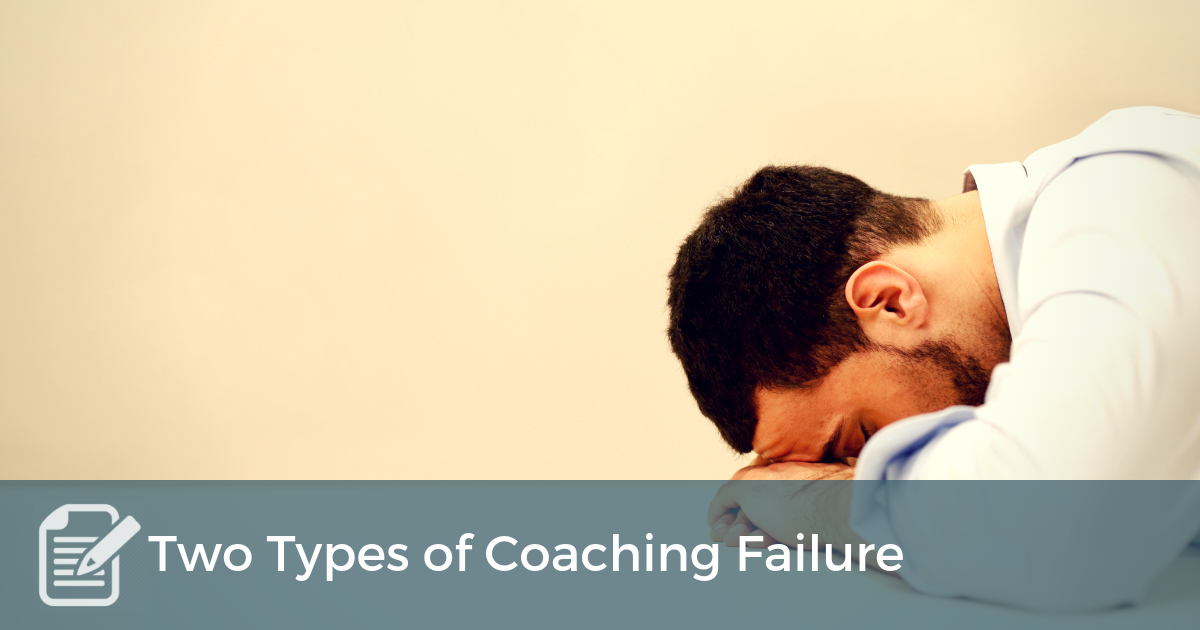 Coaches have to fail in public. We don’t have the luxury of failing where no one will see. We fail in front of a client, a group, or a team. And because of the publicness of our failure, we try not to fail. We take fewer chances. We decide not to dance in the moment. We ask risk-free questions and make risk-free observations.
Coaches have to fail in public. We don’t have the luxury of failing where no one will see. We fail in front of a client, a group, or a team. And because of the publicness of our failure, we try not to fail. We take fewer chances. We decide not to dance in the moment. We ask risk-free questions and make risk-free observations.
Adam Savage of Myth Busters fame spoke about two kinds of failure on The Tim Ferriss Show podcast.
…real failure is getting drunk and missing your kid’s birthday party. – Adam Savage
What we really mean when we say failure is we mean iteration. We mean the creative process is messy and it’s iterative and you have to chase up a lot of wrong branches in order to get to the right one. And you’re never going to end up where you think you’re going to end up. And while some people may think that that’s failure, a true creator knows that you follow the thing to where it’s going, not to where you think it ought to go. – Adam Savage
Savage describes two kinds of failure:
1. Catastrophic failure is when you the failure shuts down the conversation.
Getting drunk and missing your kid’s birthday party is this kind of failure. In coaching, these failures are usually due to not letting go of a lesser failure. You make an observation, and the client doesn’t accept it. Feeling over confident, you restate your observation with a little more strength. The client, feeling unheard and unsafe, shuts down the conversation. We are drunk on our own ability. The conversation may continue, but it will stay at a surface level.
2. Iterative failure means you make a mistake, then you make a slight change and try it again.
Iteration means repetition. Coaching should be full of iterative failure. You make an observation that doesn’t resonate with the client. You listen and learn, and then you make a better observation. You don’t go deep all at once, but you listen and observe and find better ways to open up the conversation.
Let’s say that you try to ask an open-ended discovery question with hopes that your client will have to think deeply about her answer. The client replies, “Can you ask that a different way? I’m not sure what you’re asking.”
Catastrophic failure would be to ask the question again and narrow the possible responses that only allows surface deep thinking.
Iterative failure would be to reword the question so it is still very open and give your client another chance to go deep. They may still not fully understand the question, but they’ll do their best to respond. Most clients are not used to open-ended questions. They may just need you to ask it again to feel confident they won’t sound foolish.
Let’s say you share an analogy that comes to mind that describes the client’s dilemma. With a wrinkled brow, they say, “No, I don’t think that describes my situation at all.”
Catastrophic failure would be to insist that your analogy is more right than the client knows. The client is now going to be defensive. The conversation will remain at a surface level because you believe you are more right than your client.
Iterative failure would be to accept that the analogy wasn’t helpful. You might even need to apologize. Then you might ask, “How could we change the analogy so that it better describes your situation?” We might need to abandon the analogy, but we might be able to make a slight change and try again.
Coaches must fail in public.
If you continue on risk-free, you will be a mediocre coach. If you take an iterative approach, every failure allows you to learn a little more about your client and about the topic.
A good coach takes chances. A good coach knows when to let go of a failing course of action. A good coach retools and tries again with better results.



1 thought on “Two Types of Coaching Failure”
Hi Brian Miller,
Any kind of failure in life is something people try to avoid, especially when it’s public failure. It can be seen as awkward or as a sign of weakness, but not so in the case of coaching. Be open to failure in coaching is seen as a strength and quality. In the words of Bruce Lee, “be formless, shapeless like water.”
“You don’t go deep all at once, but you listen and observe and find better ways to open up the conversation.” This reminds me of two books I am eager of getting soon.
1) Failing Forward by John C. Maxwell
“When achievers fail, they see it as a momentary event, not a lifelong epidemic.”
“Everything in life brings risk. It’s true that you risk failure if you try something bold because you might miss it. But you also risk failure if you stand still and don’t try anything new.”
2) Permission To Screw Up by Kristen Hadeed.
“If you take an iterative approach, every failure allows you to learn a little more about your client and about the topic.” Love this kind of failing approach. Failing gives us a chance to see, to adapt, and improve as we serve our client to the best of our ability. Thanks Brian!
Thanks CAM!